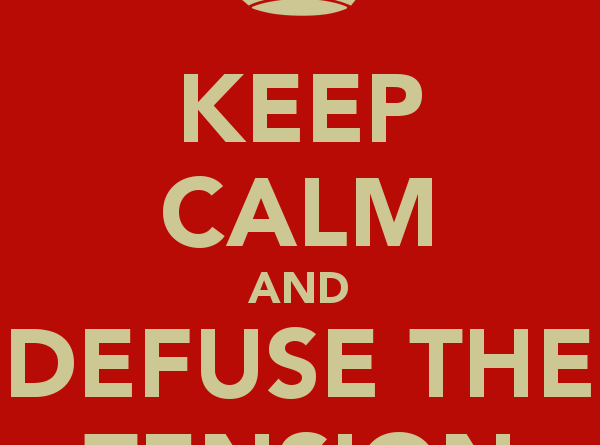Wednesday Wellbeing: Dealing with difficult opponents
Dealing with difficult opponents. By Rehna
I was sitting in the robing room, separating the sections in the case bundle with multicoloured tabs. We still had paper bundles then, so you know this story is from long ago. If I told you that, having worked late into the night, I hadn’t had the time or energy to put the tabs on earlier, you’ll also know that some things in a legal practice never change.
I felt a shadow fall over me. I looked up to see a tall woman in a ‘too short for court skirt’ glaring down at me.
“So, what’s your case?” She demanded.
No greeting. No introductions.
Startled, I quickly laid out my case. It was a strong one and I thought she would see that and think twice about her futile opposition to it.
“Is that it?” She sneered.
My confidence in my case began to wobble. Was it really that strong?
“What else?” She demanded.
I laid out my case a little more. She snorted. My wobble toppled over completely and lay crushed on the floor.
The solicitor for the children entered the room. He greeted us both politely. Short skirt turned to him, all smiles and flirty warmth.
“And what does the Guardian think?” She simpered. Yep, actually simpered. She began to discuss the case With him, politely, even charmingly. Several times I tried to join the conversation. Short skirt pointedly turned her back on me. Since she was much taller than me, it meant I couldn’t see the children’s solicitor properly and had to scramble round to join the little group. I looked like an unruly child interrupting adult conversation. Each time I tried to make a comment she talked over me, like I was little more then a buzzing fly she had to raise her voice to drown out.
I went into the hearing bowed and humiliated, no longer sure of my open and shut case. Or even of my place in it. Perhaps the case was beyond me? How would I withstand the devastating cross-examination short skirt would unleash on my witnesses? Was I even in the right career?
Now, of course, I know of such things as robing room bullying tactics. I know that when advocates demand to know your case, it’s usually because they haven’t read the papers and literally want to know the case against them without making any effort on their own part. I know, too, that their rudeness is an attempt to intimidate. I also know that some experienced advocates deliberately target young new colleagues in this way.
But back then I was young, a newbie and still finding my feet in an already intimidating profession. Short skirt played a blinder. She pressed every insecurity button she could find in me, hit every nerve of uncertainty I possessed and I imploded.
I also now know that I succeeded in the case and short skirt turned out to be something of a damp squib when it came to the crunch.
I also know that in a funny way she influenced me. After this encounter with her, I told myself that when I was more senior, I would never treat a newbie in the way that she had treated me. I hope that I have lived up to that intention.
I didn’t have the courage, at the time, to stand up for myself with this Barrister. But the fact that I can still recall the incident, years later, suggests that her belittling behavior affected me more than I care to say.
In later years, I learnt that she had a number of personal problems and liked a drink, or too many, in the evenings. It didn’t excuse her rudeness but it helped me understand possible causes for it. Who knows what private fears and insecurities she had brought into the encounter that morning.
As time went on, I dealt with rude opponents more coolly. I remember once, another woman screaming at me at the RCJ so that everyone in the corridor could hear her. She was angry at what the local authority had failed to do for her client but she was taking it out on me, as the local authority representative. She bellowed for a good five minutes about some missing police disclosure, her large red face getting redder by the second, such that I feared she might actually explode. I listened to her silently for the full five minutes. Then I got up from my seat, said simply, ‘ok’ and walked away. I can’t lie, as people do on Twitter, that everyone around me cheered but I suspect a few people smirked inside. My cool, calm response made her hysteria seem even more silly.
Rudeness can be a display of disrespect. It can be a display of power. It can be a misguided reflection of the person’s own stress or unhappiness, taken out on someone else because they can’t take it out on the real cause or person.
The effect on the person at the receiving end can be severe. It’s not always easy to do a Taylor Swift and ‘shake it off.’
Sometimes, even seemingly minor rudeness can trigger deep feelings of low self-esteem in us that our facade of confidence keeps hidden. I’ve had colleagues tell me about a bad experience at court with an opponent or judge. They usually start by minimising the incident and describing the rude person as just a bit of a prat. However, when we explore it further, it becomes clear that the effect has been far greater. So, as part of a career coaching session, the colleague and I will look further into early experiences they have had which may explain the current impact. Again, as I said, in the article about impostor syndrome, there are often deeper issues at play and each person’s experience has to be looked at individually but here are a few general tips:
- Say something at the time. Don’t let your anger and upset fester, so that it sinks into your bones to become an exposed nerve for you later. We all love to mull over (after the event) all the devastating barbs we should have slung out at the time but it’s better to just say something simple in the moment. Perhaps something along the lines of “We’re all here to represent our respective cases and we’re all doing the best we can, being rude doesn’t help.
Or you can be firmer and say something like, “I won’t be spoken to like that, please stop.”
- However you word it, remain polite. Although it may be really difficult not to lash out with something equally rude, a calm but firm response is a far better one. As they say, once you respond to anger and discourtesy with anger and discourtesy, you’ve lost the argument. So, try not to let the situation escalate into a spiralling missile of anger and rudeness. It will only cast an unpleasant cloak over the entire hearing which may last several days. Do you really want to wake up each morning for a week or so, dreading going to court because you know it’s going to be a tense experience?
- This may be even harder but don’t take it personally. I doubt that sport skirt even gave me a second thought once we finished the case. I doubt too that she specifically targeted me for her rudeness,I just happened to be the young, inexperienced opponent she came across that day. So,hard as it may be, take the advice of Atticus Finch: ‘You never really understand a person until you consider things from his point of you until you climb into his shoes and walk around in them’. We simply don’t know what is going on in someone else’s life to make them behave the way they do. We can only let them know that it’s unacceptable behaviour. We can even be kind and calming towards them. If they are a decent person going through a bad time, they may well apologise, either then or later. And if they are just plain rude and unpleasant, you will know for next time but will also have the satisfaction of knowing that you gave them a chance and didn’t lower yourself to their level. Yes, I know, being the better person can be frustrating, but in the long run it works to your advantage both professionally and personally.
- Be the opponent you would like to be against. Be the lawyer who is well prepared, polite and a pleasure to be against. You will be remembered for it. Even if no one says anything at the time, word gets around. Advocates often ask each other what X is like. Court staff notice the nice lawyers and the not so nice ones. And yes, word does get back to judges too.
- Walk away. If you have tried to defuse the situation, remained polite, shown sympathy and understanding, even tried humour but the person continues with their behaviour, just walk away. You don’t need to soak up their turmoil. You can simply turn on your heel and walk away or you can tell them that you are going to walk away until they can behave better. If they calm down, you can resume the discussion. If they don’t, just go into court and present your case. Tell the judge that you were unable to have constructive discussions and just put your case.
yours editorially
Rehna




